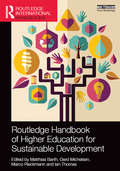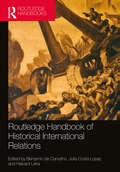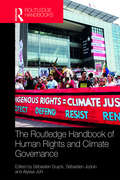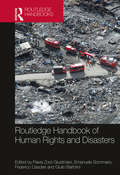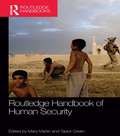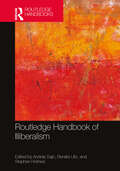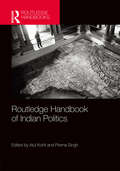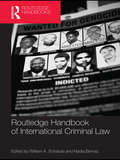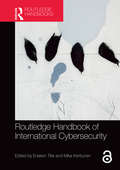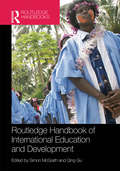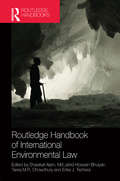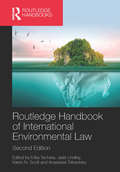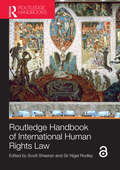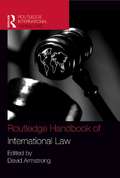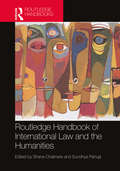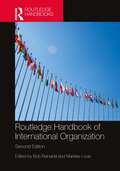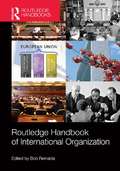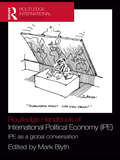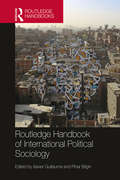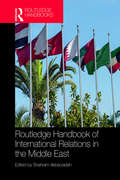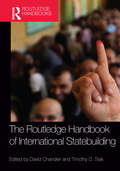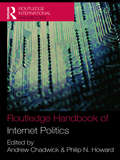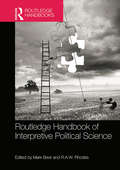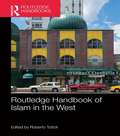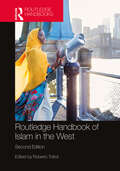- Table View
- List View
Routledge Handbook of Higher Education for Sustainable Development (Routledge International Handbooks)
by Ian Thomas Gerd Michelsen Matthias Barth Marco RieckmannThe Routledge International Handbook of Higher Education for Sustainable Development gives a systematic and comprehensive overview of existing and upcoming research approaches for higher education for sustainable development. It provides a unique resource for researchers engaged in the field of higher education for sustainable development by connecting theoretical aspects of the range of relevant methodologies, showing the interdisciplinary aspects of the research field and illustrating the breadth of research directions. With a team of international authors from leading universities in research and teaching in higher education for sustainable development this Handbook brings together a broad range of research approaches and shows how these approaches are reflected in the research practice in higher education for sustainable development. Key topics include: Research Paradigms and Methodologies Ongoing and Future Directions of Research Meta-Analysis and Reviews Policy and Politics Challenges for Implementation Action Research and Transdisciplinary Perspective Gender, Diversity and Post-Colonial Perspectives Operationalising Competencies Outcome-Oriented Research Curriculum Change Organisational Change and Organisational Learning Community and Partnerships University Appraisal Systems and Indicators Evaluation Approaches Engaging Academic Teachers Good Practice Learning and Teaching Transformative Leadership and Change Strategies This Handbook is an invaluable research and teaching tool for all those working in higher education for sustainable development.
Routledge Handbook of Historical International Relations
by Benjamin De Carvalho Halvard Leira Julia Costa LopezThis handbook presents a comprehensive, concise and accessible overview of the field of Historical International Relations (HIR). It summarizes and synthesizes existing contributions to the field while presenting central themes, approaches and methodologies that have driven the development of HIR, providing the reader with a sense of the diversity and research dynamics that are at the heart of this field of study. The wide range of topics covered are grouped under the following headings: Traditions: Demonstrates the wide variety of approaches to HIR. Thinking International Relations Historically: Different ways of thinking IR historically share some common concerns and areas for further investigation. Actors, Processes and Institutions: Explores the processes, actors, practices, and institutions that constitute the core objects of study of many HIR scholars. Situating Historical International Relations: Critically reflects about the situatedness of our objects of study. Approaches: Examines how HIR scholars conduct and reflect about their research, often in dialogue with a variety of perspectives from cognate disciplines. Summarizing key contributions and trends while also sketching out challenges for future inquiry, this is an invaluable resource for students, academics and researchers from a range of disciplines, particularly International Relations, global history, political science, history, sociology, anthropology, peace studies, diplomatic studies, security studies, international political thought, political geography, international law.
Routledge Handbook of Human Rights and Climate Governance (Routledge International Handbooks)
by Sébastien Jodoin Sébastien Duyck Alyssa JohlOver the last decade, the world has increasingly grappled with the complex linkages emerging between efforts to combat climate change and to protect human rights around the world. The Paris Climate Agreement adopted in December 2015 recognized the necessity for governments to take into consideration their human rights obligations when taking climate action. However, important gaps remain in understanding how human rights can be used in practice to develop and implement effective and equitable solutions to climate change at multiple levels of governance. This book brings together leading scholars and practitioners to offer a timely and comprehensive analysis of the opportunities and challenges for integrating human rights in diverse areas and forms of global climate governance. The first half of the book explores how human rights principles and obligations can be used to reconceive climate governance and shape responses to particular aspects of climate change. The second half of the book identifies lessons in the integration of human rights in climate advocacy and governance and sets out future directions in this burgeoning domain. Featuring a diverse range of contributors and case studies, this Handbook will be an essential resource for students, scholars, practitioners and policy makers with an interest in climate law and governance, human rights and international environmental law.
Routledge Handbook of Human Rights and Disasters (Routledge Studies in Humanitarian Action)
by Federico Casolari Flavia Zorzi Giustiniani Emanuele Sommario Giulio BartoliniThe Routledge Handbook of Human Rights and Disasters provides the first comprehensive review of the role played by international human rights law in the prevention and management of natural and technological disasters. Each chapter is written by a leading expert and offers a state-of-the-art overview of a significant topic within the field. In addition to focussing on the role of human rights obligations in disaster preparedness and response, the volume offers a broader perspective by examining how human rights law interacts with other legal regimes and by addressing the challenges facing humanitarian organizations. Preceded by a foreword by the International Law Commission’s Special Rapporteur on the Protection of Persons in the Event of Disasters, the volume is divided into four parts: Part I: Human rights law and disasters in the framework of public international law Part II: Role and application of human rights law in disaster settings Part III: (Categories of) rights of particular significance in a disaster context Part IV: Protection of vulnerable groups in disaster settings Providing up-to-date and authoritative contributions covering the key aspects of human rights protection in disaster settings, this volume will be of great interest to scholars and students of humanitarianism, international law, EU law, disaster management and international relations, as well as to practitioners in the field of disaster management.
Routledge Handbook of Human Security
by Taylor Owen Mary MartinThis Handbook will serve as a standard reference guide to the subject of human security, which has grown greatly in importance over the past twenty years. Human security has been part of academic and policy discourses since it was first promoted by the UNDP in its 1994 Human Development Report. Filling a clear gap in the current literature, this volume brings together some of the key scholars and policy-makers who have contributed to its emergence as a mainstream concept, including Nobel prize winner Amartya Sen and Sadako Ogata, who jointly chaired the 2001 Commission on Human Security. Drawing upon a range of theoretical and empirical analyses, the Handbook provides examples of the use of human security in policies as diverse as disaster management, arms control and counter-terrorism, and in different geographic and institutional settings from Asia to Africa, and the UN. It also raises important questions about how the concept might be adapted and operationalised in future. Over the course of the book, the authors draw on three key aspects of human security thinking: Theoretical issues to do with defining human security as a specific discourse Human security from a policy and institutional perspective, and how it is operationalised in different policy and geographic contexts Case studies and empirical work Featuring some of the leading scholars in the field, the Routledge Handbook of Human Security will be essential reading for all students of human security, critical security, conflict and development, peace and conflict studies, and of great interest to students of international security and IR in general.
Routledge Handbook of Illiberalism
by András SajóThe Routledge Handbook of IIliberalism is the first authoritative reference work dedicated to illiberalism as a complex social, political, cultural, legal, and mental phenomenon. Although illiberalism is most often discussed in political and constitutional terms, its study cannot be limited to such narrow frames. This Handbook comprises sixty individual chapters authored by an internationally recognized group of experts who present perspectives and viewpoints from a wide range of academic disciplines. Chapters are devoted to different facets of illiberalism, including the history of the idea and its competitors, its implications for the economy, society, government and the international order, and its contemporary iterations in representative countries and regions. The Routledge Handbook of IIliberalism will form an important component of any library's holding; it will be of benefit as an academic reference, as well as being an indispensable resource for practitioners, among them journalists, policy makers and analysts, who wish to gain an informed understanding of this complex phenomenon.
Routledge Handbook of Indian Politics
by Atul Kohli Prerna SinghIndia’s growing economic and socio-political importance on the global stage has triggered an increased interest in the country. This Handbook is a reference guide, which surveys the current state of Indian politics and provides a basic understanding of the ways in which the world’s largest democracy functions. The Handbook is structured around four main topics: political change, political economy, the diversity of regional development, and the changing role of India in the world. Chapters examine how and why democracy in India put down firm roots, but also why the quality of governance offered by India’s democracy continues to be low. The acceleration of economic growth since the mid-1980s is discussed, and the Handbook goes on to look at the political and economic changes in selected states, and how progress across Indian states continues to be uneven. It concludes by touching on the issue of India’s international relations, both in South Asia and the wider world. The Handbook offers an invigorating initiation into the seemingly daunting and complex terrain of Indian politics. It is an invaluable resource for academics, researchers, policy analysts, graduate and undergraduate students studying Indian politics.
Routledge Handbook of International Criminal Law
by William A. SchabasInternational criminal law has developed extraordinarily quickly over the last decade, with the creation of ad hoc tribunals in the former Yugoslavia and Rwanda, and the establishment of a permanent International Criminal Court. This book provides a timely and comprehensive survey of emerging and existing areas of international criminal law. The Handbook features new, specially commissioned papers by a range of international and leading experts in the field. It contains reflections on the theoretical aspects and contemporary debates in international criminal law. The book is split into four parts for ease of reference: The Historical and Institutional Framework – Sets international criminal law firmly in context with individual chapters on the important developments and key institutions which have been established. The Crimes – Identifies and analyses international crimes, including a chapter on aggression. The Practice of International Tribunals – Focuses on topics relating to the practice and procedure of international criminal law. Key Issues in International Criminal Law – Goes on to explore issues of importance such as universal jurisdiction, amnesties and international criminal law and human rights. Providing easy access to up-to-date and authoritative articles covering all key aspects of international criminal law, this book is an essential reference work for students, scholars and practitioners working in the field.
Routledge Handbook of International Cybersecurity
by Eneken Tikk Mika KerttunenThe Routledge Handbook of International Cybersecurity examines the development and use of information and communication technologies (ICTs) from the perspective of international peace and security. Acknowledging that the very notion of peace and security has become more complex, the volume seeks to determine which questions of cybersecurity are indeed of relevance for international peace and security and which, while requiring international attention, are simply issues of contemporary governance or development. The Handbook offers a variety of thematic, regional and disciplinary perspectives on the question of international cybersecurity, and the chapters contextualize cybersecurity in the broader contestation over the world order, international law, conflict, human rights, governance and development. The volume is split into four thematic sections: Concepts and frameworks; Challenges to secure and peaceful cyberspace; National and regional perspectives on cybersecurity; Global approaches to cybersecurity. This book will be of much interest to students of cybersecurity, computer science, sociology, international law, defence studies and International Relations in general.
Routledge Handbook of International Education and Development (Routledge International Handbooks)
by Simon McGrath & Qing GuThis timely Handbook takes stock of the range of debates that characterise the field of international education and development, and suggests key aspects of a research agenda for the next period. It is deliberately divergent in its approach, recognising the major ideological and epistemological divides that characterise a field that draws on many traditions. Leading and emergent voices from different paradigms and contexts are afforded a space to be heard and each section puts current debates in larger historical contexts. The Handbook is divided in four parts and book-ended by an introduction and a conclusion, the latter oriented towards the implications that the volume has for future research agendas. The first part explores major strands of debates about education’s place in development theory. The second acknowledges the disciplining of the field by the education for all movement and examines the place that learning and teaching, and schools play in development. Part three looks beyond schools to consider early years, adult and vocational education but focuses particularly on the return to thinking about higher education's role in development. The final part considers the changing, but still important, role that international cooperation plays in shaping education in developing countries. Featuring over thirty chapters written by leading international and interdisciplinary scholars, the Routledge Handbook of International Education and Development offers the first comprehensive and forward-looking resource for students and scholars.
Routledge Handbook of International Environmental Law
by Shawkat Alam Erika J. Techera Md Jahid Hossain Bhuiyan Tareq M.R. ChowdhuryThe Routledge Handbook of International Environmental Law is an advanced level reference guide which provides a comprehensive and contemporary overview of the corpus of international environmental law (IEL). The Handbook features specially commissioned papers by leading experts in the field of international environmental law, drawn from a range of both developed and developing countries in order to put forward a truly global approach to the subject. Furthermore, it addresses emerging and cross-cutting issues of critical importance for the years ahead. The book is split into six parts for ease of reference: The Legal Framework, Theories and Principles of International Environmental Law - focuses on the origins, theory, principles and development of the discipline; Implementing International Environmental Law - addresses the implementation of IEL and the role of various actors and institutions, including corporations, intergovernmental organisations and NGOs; Key Issues and Legal Frameworks - brings fresh perspectives of the common general issues of international environmental law, such as biological diversity and marine environmental law; Regional Environmental Law - explores the specific regimes developed to address regional environmental issues, considering the evolution, prospects and relationship of regional law and mechanisms to IEL; Cross-Cutting Issues - considers the engagement of international environmental law with other key fields and legal regimes, including international trade, human rights and armed conflict; Contemporary and Future Challenges - analyses pressing current and emerging issues in the field including environmental refugees and climate change, REDD and deforestation, and ‘treaty congestion’ in IEL. This up-to-date and authoritative book makes it an essential reference work for students, scholars and practitioners working in the field.
Routledge Handbook of International Environmental Law
by Erika Techera; Jade Lindley; Karen N. Scott; Anastasia TelesetskyThis book critically explores the legal tools, concepts, principles and instruments, as well as cross-cutting issues, that comprise the field of international environmental law. Commencing with foundational elements, progressing on to discrete sub-fields, then exploring regional cooperative approaches, cross-cutting issues and finally emerging challenges for international environmental law, it features chapters by leading experts in the field of international environmental law, drawn from a range of countries in order to put forward a truly global approach to the subject. The book is split into five parts: • The foundations of international environmental law covering the principles of international environmental law, standards and voluntary commitments, sustainable development, issues of public participation and environmental rights and compliance, state responsibility, liability and dispute settlement. • The key instruments and governance arrangements across the most critical areas of international environmental law: biodiversity, wildlife, freshwater, forestry and soils, fisheries, marine pollution, chemicals and waste, air and atmospheric pollution and climate change. • Crucial developments in seven distinct regions of the world: Africa, Europe, North America, Latin America, South East Asia, the polar regions and small island states. • Cross-cutting issues and multidisciplinary developments, drawing from multiple other fields of law and beyond to address human rights and Indigenous rights, war and armed conflict, trade, financing, investment, criminology, technology and energy. • Contemporary challenges and the emerging international environmental law regimes which address these: the changing climate, forced migration, marine plastic debris and future directions in international environmental law. Containing chapters on the most critical developments in environmental law in recent years, this comprehensive and authoritative book makes for an essential reference work for students, scholars and practitioners working in the field.
Routledge Handbook of International Human Rights Law
by Scott Sheeran Nigel RodleyThe Routledge Handbook of International Human Rights Law provides the definitive global survey of the discipline of international human rights law. Each chapter is written by a leading expert and provides a contemporary overview of a significant area within the field. As well as covering topics integral to the theory and practice of international human rights law the volume offers a broader perspective though examinations of the ways in which human rights law interacts with other legal regimes and other international institutions, and by addressing the current and future challenges facing human rights. Providing up-to-date and authoritative articles covering key aspects of international human rights law, this book work is an essential work of reference for scholars, practitioners and students alike. Chapter 35 of this book is freely available as a downloadable Open Access PDF under a Creative Commons Attribution-Non Commercial-No Derivatives 3.0 license. https://www.routledgehandbooks.com/doi/10.4324/9780203481417.ch35
Routledge Handbook of International Law (Routledge International Handbooks)
by David ArmstrongThe Routledge Handbook of International Law provides a definitive global survey of the interaction of international politics and international law. Each chapter is written by a leading expert and provides a state of the art overview of the most significant areas within the field. This highly topical collection of specially commissioned papers from both established authorities and rising stars is split into four key sections: The Nature of International Law including the interaction between the disciplines of International Law and International Relations The Evolution of International Law progressing from the ancient world to present day. Law and Power in International Society discussing topical issues such as the war in Iraq and the international criminal court Key Issues in International Law including international refugee law, indigenous rights, intellectual property, trade and the challenges presented by "new terrorism". A comprehensive survey of the state of the discipline, The Routledge Handbook of International Law is an essential work of reference for scholars and practitioners of international Law.
Routledge Handbook of International Law and the Humanities
by Shane Chalmers; Sundhya PahujaThis Handbook brings together 40 of the world’s leading scholars and rising stars who study international law from disciplines in the humanities – from history to literature, philosophy to the visual arts – to showcase the distinctive contributions that this field has made to the study of international law over the past two decades. Including authors from Australia, Canada, Europe, India, South Africa, the UK and the USA, all the contributors engage the question of what is distinctive, and critical, about the work that has been done and that continues to be done in the field of ‘international law and the humanities’. For many of these authors, answering this question involves reflecting on the work they themselves have been contributing to this path-breaking field since its inception at the end of the twentieth century. For others, it involves offering models of the new work they are carrying out, or else reflecting on the future directions of a field that has now taken its place as one of the most important sites for the study of international legal practice and theory. Each of the book’s six parts foregrounds a different element, or cluster of elements, of international law and the humanities, from an attention to the office, conduct and training of the jurist and jurisprudent (Part 1); to scholarly craft and technique (Part 2); to questions of authority and responsibility (Part 3); history and historiography (Part 4); plurality and community (Part 5); as well as the challenge of thinking, and rethinking, international legal concepts for our times (Part 6). Outlining new ways of imagining, and doing, international law at a moment in time when original, critical thought and practice is more necessary than ever, this Handbook will be essential for scholars, students and practitioners in international law, international relations, as well as in law and the humanities more generally.
Routledge Handbook of International Organization
by James Church Antoine Pécoud Davide Rodogno Simon Hug Thomas Sommerer Nigel D. White Charles Roger Steffen Eckhard Richard Collins Michael W. Bauer Sandrine Kott Didier Georgakakis Jarle Trondal Andrea Liese Spyros Blavoukos Dimitris Bourantonis Kirsten Haack Sabine Saurugger Shoshana Fine Corneliu Bjola Yolanda Kemp Spies Aigul Kulnazarova Olivier Schmitt Karsten Ronit Ulf Engel Matias E. Margulis Andrea Ribeiro Hoffmann Chiara Ruffa Jörn Ege Bob Reinalda Bertjan Verbeek Takeshi Yuzawa Sabine Dini Erik Voeten Jens Herpolsheimer Marieke Louis Lucile Maertens Eva-Maria Muschik Hans Agné Manuel Fröhlich Kent J. Kille Elizabeth A. Bloodgood Auriane Guilbaud Giulia Scalettaris Mélanie Albaret Fanny Badache Dawisson Belém Lopes Quentin Deforge Sandrine De Sena Julian Fernandez Paulo Ferraz Oliveira, João Marion Fresia Peter Hajnal Min-Hua Huang Jin Mun Jeong Leah R. Kimber Marta Lagos Michael McCaffrey Vanessa Newby Olsson Gardell, Eva-Karin Dursun Peksen Delphine Placidi-Frot Emilija Pundziūtė-Gallois Hans Peter Schmitz Charles Tenenbaum Felicity Vabulas van der Vleuten, AnnaThis completely revised and rewritten handbook gives an overview of international organization (IO) as a dynamic field of research that adds to our understanding of global and regional relations and related domestic politics. Bringing together international scholars from a range of disciplines, it considers both IO as a process and multilateral organizations as institutions. This handbook is divided into five parts:I. Documentation, sources and perspectivesII. International secretariats as bureaucraciesIII. Actors within and beyond international bureaucraciesIV. Processes within and beyond international bureaucraciesV. Challenges to international organizationsContaining new chapters on topics such as the anthropological perspective, IO secretariats in several continents outside of Europe, feminization, the digital turn and challenges to IO legitimacy, the contributors reflect on the progression of IO studies from a burgeoning field to a well‑established subfield of international relations and the move away from scholarship based mainly in North‑Western Europe and the United States. This book will be of particular interest to scholars and students of IOs, global governance, diplomacy and foreign policy, as well as practitioners of multilateral cooperation.
Routledge Handbook of International Organization
by Bob ReinaldaThis Handbook brings together scholars whose essays discuss significant issues with regard to international organization as a process and international organizations as institutions. Although the focus is on intergovernmental organizations (IGOs), non-governmental organizations (NGOs) are discussed where relevant. The handbook is divided into six parts: Documentation, Data Sets and Sources International Secretariats as Bureaucracies Actors within International Bureaucracies Processes within International Bureaucracies Challenges to International Organizations, and Expanding International Architectures. The state-of-the-art articles are meant to encourage current and future generations of scholars to enjoy working in and further exploiting the field and are also of great interest to practitioners of international organization and global governance
Routledge Handbook of International Political Economy (IPE): IPE as a Global Conversation
by Mark BlythThe study of the International Political Economy (IPE), like the IPE itself, is plural and unbounded. Despite what partisans sometimes say, rather than there being ‘one way’ of studying the IPE that is the ‘right way’, we find across the world great variation in IPE scholarship in terms of focus, questions, and methods. How then can we make sense of this and understand the field as a whole rather than simply learn one part of it? This Handbook is designed to address precisely this concern. It maps the shifting boundaries and diverse theoretical commitments of IPE around the world. It engages the geographical and theoretical diversity of the different versions of IPE found in North America, the UK, in Asia and Australia; and notes the absences of distinctive versions of IPE in Europe and Latin America. The volume groups together the essential attributes and positions of each school, inviting the reader to engage with and learn about IPE in all of its guises through this evolving ‘global conversation.’ Rather than adjudicate ‘the one true version’ of IPE, it argues that the intellectual diversity we see around the world is an essential, and positive, feature of the field. With over twenty contributors from a wide range of countries Routledge Handbook of International Political Economy is an essential resource for all those with an interest in this complex and rapidly evolving field of study.
Routledge Handbook of International Political Sociology
by P Nar Bilgin Xavier GuillaumeThis handbook presents in a comprehensive, concise and accessible overview, the emerging field of international political sociology. It summarizes and synthesizes existing knowledge in the field while presenting central themes and methodologies that have been at the centre of its development, providing the reader with a sense of the diversity and research dynamics that are at the heart of international political sociology as a field of study. A wide range of topics covered include: International political sociology and its cognate disciplines and fields of study; Key themes including security, mobility, finance, development, gender, religion, health, global elites and the environment; Methodologies on how to engage with international political sociology including fieldwork, archives, discourse, ethnography, assemblage, materiality, social spaces and visuality; Current and future challenges of international political sociology addressed by three key scholars. Providing a synthetic reference point, summarizing key achievements and engagements while putting forward future developments and potential fruitful lines of inquiry, it is an invaluable resource for students, academics and researchers from a range of disciplines, particularly international relations, political science, sociology, political geography, international law, international political economy, security studies and gender studies.
Routledge Handbook of International Relations in the Middle East
by Shahram AkbarzadehThis handbook examines the regional and international dynamics of the Middle East. It challenges the state society dichotomy to make sense of decision-making and behavior by ruling regimes. The 33 chapter authors include the world’s leading scholars of the Middle East and International Relations (IR) in order to make sense of the region. This synthesis of area studies expertise and IR theory provides a unique and rigorous account of the region’s current dynamics, which have reached a crisis point since the beginning of the Arab Spring. The Middle East has been characterized by volatility for more than a century. Although the region attracts significant scholarly interest, IR theory has rarely been used as a tool to understand events. The constructivist approach in IR highlights the significance of state identity, shaped by history and culture, in making sense of international relations. The authors of this volume consider how IR theory can elucidate the patterns and principles that shape the region, in order to provide a rigorous account of the contemporary challenges of the Middle East. The Routledge Handbook of International Relations in the Middle East provides comprehensive coverage of International Relations issues in the region. Thus, it offers key resources for researchers and students interested in International Relations and the Middle East.
Routledge Handbook of International Statebuilding
by David Chandler Timothy D. SiskThis new Handbook offers a combination of theoretical, thematic and empirical analyses of the statebuilding regime, written by leading international scholars. Over the past decade, international statebuilding has become one of the most important and least understood areas of international policy-making. Today, there are around one billion people living in some 50-60 conflict-affected, 'fragile' states, vulnerable to political violence and civil war. The international community grapples with the core challenges and dilemmas of using outside force, aid, and persuasion to build states in the wake of conflict and to prevent such countries from lapsing into devastating violence. The Routledge Handbook of International Statebuilding is a comprehensive resource for this emerging area in International Relations. The volume is designed to guide the reader through the background and development of international statebuilding as a policy area, as well as exploring in depth significant issues such as security, development, democracy and human rights. Divided into three main parts, this Handbook provides a single-source overview of the key topics in international statebuilding: Part One: Concepts and Approaches Part Two: Security, Development and Democracy Part Three: Policy Implementation This Handbook will be essential reading for students of statebuilding, humanitarian intervention, peacebuilding, development, war and conflict studies and IR/Security Studies in general.
Routledge Handbook of Internet Politics
by Philip N. Howard Andrew ChadwickThe politics of the internet has entered the social science mainstream. From debates about its impact on parties and election campaigns following momentous presidential contests in the United States, to concerns over international security, privacy and surveillance in the post-9/11, post-7/7 environment; from the rise of blogging as a threat to the traditional model of journalism, to controversies at the international level over how and if the internet should be governed by an entity such as the United Nations; from the new repertoires of collective action open to citizens, to the massive programs of public management reform taking place in the name of e-government, internet politics and policy are continually in the headlines. The Routledge Handbook of Internet Politics is a collection of over thirty chapters dealing with the most significant scholarly debates in this rapidly growing field of study. Organized in four broad sections: Institutions, Behavior, Identities, and Law and Policy, the Handbook summarizes and criticizes contemporary debates while pointing out new departures. A comprehensive set of resources, it provides linkages to established theories of media and politics, political communication, governance, deliberative democracy and social movements, all within an interdisciplinary context. The contributors form a strong international cast of established and junior scholars. This is the first publication of its kind in this field; a helpful companion to students and scholars of politics, international relations, communication studies and sociology.
Routledge Handbook of Interpretive Political Science
by Mark Bevir R. A. RhodesInterpretive political science focuses on the meanings that shape actions and institutions, and the ways in which they do so. This Handbook explores the implications of interpretive theory for the study of politics. It provides the first definitive survey of the field edited by two of its pioneers. Written by leading scholars from a range of disciplinary backgrounds, the Handbook’s 32 chapters are split into five parts which explore: the contrast between interpretive theory and mainstream political science; the main forms of interpretive theory and the theoretical concepts associated with interpretive political science; the methods used by interpretive political scientists; the insights provided by interpretive political science on empirical topics; the implications of interpretive political science for professional practices such as policy analysis, planning, accountancy, and public health. With an emphasis on the applications of interpretive political science to a range of topics and disciplines, this Handbook is an invaluable resource for students, scholars, and practitioners in the areas of international relations, comparative politics, political sociology, political psychology, and public administration.
Routledge Handbook of Islam in the West
by Roberto TottoliIslam has long been a part of the West in terms of religion, culture, politics and society. Discussing this interaction from al-Andalus to the present, this Handbook explores the influence Islam has had, and continues to exert; particularly its impact on host societies, culture and politics. Highlighting specific themes and topics in history and culture, chapters cover: European paradigms Muslims in the Americas Cultural interactions Islamic cultural contributions to the Western world Western contributions to Islam Providing a sound historical background, from which a nuanced overview of Islam and Western society can be built, the Routledge Handbook of Islam in the West brings to the fore specific themes and topics that have generated both reciprocal influence, and conflict. Presenting readers with a range of perspectives from scholars based in Europe, the US, and the Middle East, this Handbook challenges perceptions on both western and Muslim sides and will be an invaluable resource for policymakers and academics with an interest in the History of Islam, Religion and the contemporary relationship between Islam and the West.
Routledge Handbook of Islam in the West
by Roberto TottoliWith new topics and contributions, this updated second edition discusses the history and contemporary presence of Islam in Europe and America. The book debates the relevance and multi-faceted participation of Muslims in the dynamics of Western societies, challenging the changing perception on both sides. Collating over 30 chapters, written by experts from around the world, the volume presents a wide range of perspectives. Case studies from the Muslim presence in the Iberian Peninsula between the Middle Ages and the modern age set off the Handbook, along with an outline of Muslims in America up to the twentieth century. The second part covers concepts around new conditions in terms of consolidating identities, the emergence of new Muslim actors, the appearance of institutions and institutional attitudes, the effects of Islamic presence on the arts and landscapes of the West, and the relational dynamics like ethics and gender. Exploring the influence of Islam, particularly its impact on society, culture and politics, this interdisciplinary volume is a key resource for policymakers, academics and students interested in the history of Islam, religion and the contemporary relationship between Islam and the West.
